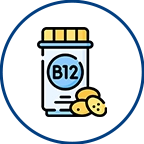The Myth of Tea Causing Acidity: Debunking Common Misconceptions

People all across the world have cherished tea for ages because of its wide variety of flavors and potential health benefits.However, there has been a persistent myth that tea can cause acidity, leading many to avoid it, especially those who are prone to digestive issues. In this blog, we'll explore the myth of tea causing acidity and debunk the common misconceptions associated with this belief.
Understanding Acidity
Before we delve into the world of tea and its impact on acidity, it's essential to understand what acidity means in the context of digestion. Acidity, When used in this way, it alludes to acid reflux or heartburn, a condition where the esophagus becomes uncomfortable and burning due to stomach acid flowing back into it. It's important to distinguish this from the pH level of tea, which can vary but is generally not acidic enough to trigger digestive problems.
Home Sample Collection
Myth 1: All Tea is Acidic
One of the most common misconceptions is that all tea is inherently acidic and can lead to heartburn or acid reflux. While it's true that some teas are more acidic than others, the overall pH of tea is not low enough to cause digestive issues for most people. In fact, many teas are considered alkaline or neutral, which can actually help soothe an upset stomach.
Myth 2: Caffeine in Tea Causes Acidity
Another misconception is that the caffeine content in tea is responsible for acidity. While caffeine can relax the lower esophageal sphincter (LES) muscle, potentially allowing stomach acid to flow back into the esophagus, this effect is generally mild and varies from person to person. Not all teas contain high levels of caffeine, and there are caffeine-free tea options available, making it possible to enjoy tea without worrying about its caffeine content.
Myth 3: Herbal Teas Are Safe from Acidity
Some individuals believe that herbal teas are safe from causing acidity since they don't contain caffeine. While it's true that herbal teas are caffeine-free, they can still have b properties that affect digestion. For instance, certain herbs like peppermint and spearmint can relax the LES, potentially leading to heartburn in susceptible individuals. However, this doesn't mean all herbal teas will cause acidity, as it largely depends on the specific ingredients used.
Debunking the Myths
Now that we've addressed these common misconceptions, let's set the record straight:
Tea pH Levels: Most tea falls within the pH range of 6 to 8, which is considered neutral to slightly alkaline. This pH range is generally safe for most people and should not trigger acidity issues.
Caffeine Sensitivity: Choose decaffeinated tea or low-caffeine variants if you are sensitive to caffeine and find that it makes your symptoms of acid reflux worse.
Herbal Teas: While some herbal teas may affect digestion, not all herbal teas are problematic. Experiment with different herbal blends to find the ones that suit your digestive system best. Ginger tea, for example, is known for its potential to soothe the stomach.
Tips for Enjoying Tea Without Acidity
If you enjoy tea but want to minimize the risk of acidity, here are some tips to keep in mind:
Choose Low-Acidity Teas: Opt for teas with lower acidity levels, such as green tea, white tea, or certain herbal blends.
Limit Caffeine: If caffeine exacerbates your acid reflux, go for decaffeinated tea or herbal teas that are naturally caffeine-free.
Moderation: Avoid excessive consumption of tea, as overindulgence in any beverage can potentially lead to digestive discomfort.
Listen to Your Body: Pay attention to how your body reacts to different types of tea. Everyone's tolerance and sensitivity to tea vary, so adjust your choices accordingly.
Conclusion
In conclusion, the myth that tea causes acidity is not entirely accurate. While certain teas and factors like caffeine can potentially contribute to acid reflux in susceptible individuals, it is not a blanket statement that applies to all tea lovers. The pH levels of tea are generally safe, and by selecting the right teas and being mindful of caffeine intake, you can enjoy a cup of tea without worrying about acidity issues. Remember to listen to your body and make choices that work best for your individual digestive system, and you can continue to savor the delightful world of tea without fear.
Frequently Asked Questions
Is all tea acidic?
No, not all tea is acidic. While the pH levels of tea can vary, many teas are considered neutral to slightly alkaline, with pH levels between 6 and 8. Some herbal teas and certain varieties like green and white tea are even less acidic, making them less likely to trigger acidity.
Does caffeine in tea cause acidity?
Caffeine can potentially relax the lower esophageal sphincter (LES) muscle, This can permit esophageal reflux of stomach acid, resulting in heartburn. However, the effect of caffeine on acidity varies from person to person, and not all teas contain high levels of caffeine.
Are herbal teas safe from causing acidity?
Not necessarily. While herbal teas are caffeine-free, some herbs used in herbal teas, like peppermint and spearmint, can relax the LES and potentially lead to heartburn in susceptible individuals. It's essential to be mindful of the specific ingredients in herbal blends.
How can I enjoy tea without the risk of acidity?
To enjoy tea without worrying about acidity, consider the following tips:
Choose lower-acidity teas, such as green tea or white tea.
Opt for decaffeinated tea or naturally caffeine-free herbal teas if caffeine exacerbates your acid reflux.
Experiment with different herbal blends to find ones that agree with your digestive system.
Practice moderation in tea consumption to prevent overindulgence.
Can I drink tea if I have acid reflux or GERD?
It depends on your individual tolerance. Certain teas may make some people with acid reflux or gastroesophageal reflux disease (GERD) feel worse, while others may not have any problems.. It's essential to listen to your body and adjust your tea choices accordingly. You may want to consult a healthcare professional for personalized advice.
Are there specific teas that can help with digestion?
Yes, certain teas are known for their potential to soothe the stomach and aid digestion. Ginger tea, for example, is renowned for its digestive benefits. Chamomile tea is another option known for its calming effect on the digestive system.
Can drinking tea in moderation be part of a healthy diet?
Yes, drinking tea in moderation can be part of a balanced and healthy diet for most people. Tea offers various potential health benefits, including antioxidants and compounds that may support overall well-being. As long as you choose teas that agree with your digestive system and consume them in moderation, they can be a delightful and healthful addition to your daily routine.
Book Your Slot
Our Locations Near You in Hyderabad
3KM from Banjara Hills
1.9KM from Yusufguda
3KM from Madhura Nagar
5KM from Shaikpet
Profiles
- Cardiac Risk Profile
- Pituitary marker Profile
- Rheumatoid Arthritis Profile
- Dengue Fever Panel
- Lung Cancer Panel 1 Complete Molecular
- Gastroenteritis Screening Panel
- Thyroid Profile (T3,T4,TSH), Serum
- Pancreatic Marker Profile
- STD profile
- Androgen Profile
- Lipid Profile, Serum
- Pancreatic(acute)Profile
- PCOD Profile
Radiology
Pathology Tests
- Glucose Fasting (FBS),Sodium Fluoride Plasma
- Creatinine, Serum
- Glycosylated Hemoglobin (HbA1C)
- Vitamin B12 (Cyanocobalamin), Serum
- Thyroid Stimulating Hormone (TSH) Ultrasensitive, Serum
- Complete Urine Examination (CUE), Urine
- Liver Function Test (LFT),Serum
- Dengue (IgG & IgM), Serum
- Dengue Antigen (Ns1) Rapid, Serum
- C-Reactive Protein (CRP), Serum
- Widal (Slide Method), Serum
- Total IgE, Serum




